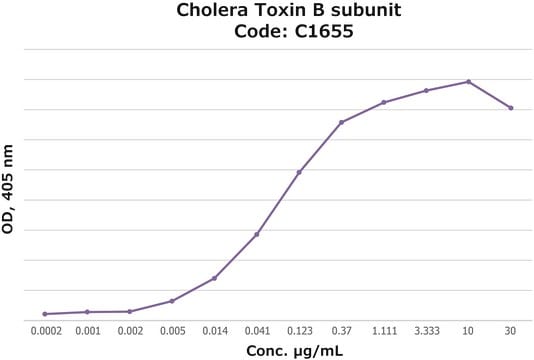E8656
Heat-Labile Enterotoxin, B subunit from E. coli
recombinant, expressed in Pichia pastoris, >90% (SDS-PAGE), lyophilized powder
Synonyme(s) :
LTB
About This Item
Produits recommandés
Produit recombinant
expressed in Pichia pastoris
Niveau de qualité
Pureté
>90% (SDS-PAGE)
Forme
lyophilized powder
Conditions d'expédition
wet ice
Température de stockage
2-8°C
Application
Actions biochimiques/physiologiques
Caractéristiques et avantages
Forme physique
Remarque sur l'analyse
Mention d'avertissement
Warning
Mentions de danger
Conseils de prudence
Classification des risques
Acute Tox. 4 Dermal - Aquatic Chronic 3
Code de la classe de stockage
11 - Combustible Solids
Classe de danger pour l'eau (WGK)
WGK 1
Point d'éclair (°F)
Not applicable
Point d'éclair (°C)
Not applicable
Équipement de protection individuelle
Eyeshields, Faceshields, Gloves, type ABEK (EN14387) respirator filter
Certificats d'analyse (COA)
Recherchez un Certificats d'analyse (COA) en saisissant le numéro de lot du produit. Les numéros de lot figurent sur l'étiquette du produit après les mots "Lot" ou "Batch".
Déjà en possession de ce produit ?
Retrouvez la documentation relative aux produits que vous avez récemment achetés dans la Bibliothèque de documents.
Les clients ont également consulté
Notre équipe de scientifiques dispose d'une expérience dans tous les secteurs de la recherche, notamment en sciences de la vie, science des matériaux, synthèse chimique, chromatographie, analyse et dans de nombreux autres domaines..
Contacter notre Service technique












